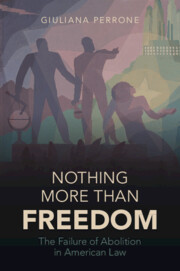Book contents
- Nothing More than Freedom
- Studies in Legal History
- Nothing More than Freedom
- Copyright page
- Dedication
- Contents
- Figures
- Acknowledgments
- Introduction
- 1 The Contract Controversy
- 2 Wreck and Ruin
- 3 By Force It Was Destroyed
- 4 Confederate Reckonings
- 5 Life after the Death of Slavery
- 6 Back into the Days of Slavery
- 7 The Grave Question
- 8 Final Failure
- Epilogue
- Bibliography
- Index
6 - Back into the Days of Slavery
Published online by Cambridge University Press: 04 May 2023
- Nothing More than Freedom
- Studies in Legal History
- Nothing More than Freedom
- Copyright page
- Dedication
- Contents
- Figures
- Acknowledgments
- Introduction
- 1 The Contract Controversy
- 2 Wreck and Ruin
- 3 By Force It Was Destroyed
- 4 Confederate Reckonings
- 5 Life after the Death of Slavery
- 6 Back into the Days of Slavery
- 7 The Grave Question
- 8 Final Failure
- Epilogue
- Bibliography
- Index
Summary
Suits related to freedpeople’s marriages – the linchpin of familial legitimacy – put the disabilities of the slave past, rather than newly granted rights, at the center of discussions about freedom and abolition. In each, a domestic conflict exposed the need to consider the previous actions and intentions of freedpeople, and prompted an assessment of how the established laws and customs of domesticity could be applied to those formerly excluded from their protection. Rather than exposing the ways that race and former status determined whether freedpeople were entitled to equal rights, this chapter considers whether former status prevented some rights – including the most fundamental among them – from being enjoyed at all.
Keywords
- Type
- Chapter
- Information
- Nothing More than FreedomThe Failure of Abolition in American Law, pp. 175 - 202Publisher: Cambridge University PressPrint publication year: 2023

